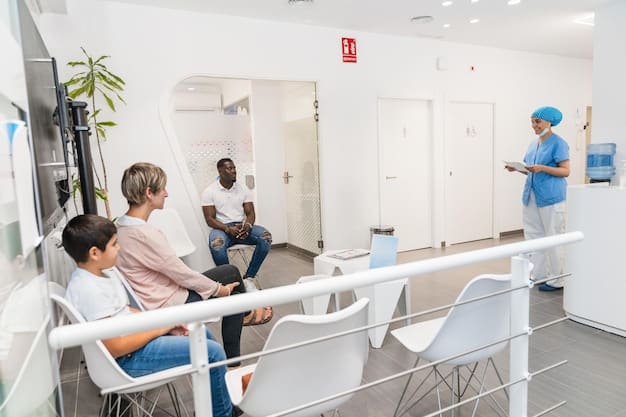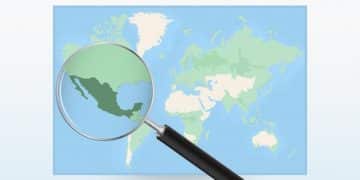Mexico’s Healthcare Update: Expats Guide to Access & Costs

Navigating Mexico’s healthcare system requires understanding current access, cost implications, and available options for US expatriates, ensuring informed decisions for medical needs abroad.
For many US expatriates considering or already living in Mexico, understanding the local healthcare system is a paramount concern. This comprehensive guide, focused on Mexico’s Healthcare System Update: What US Expats Need to Know About Access and Costs, aims to clarify the landscape of medical services available, from public institutions to private facilities, and the financial considerations involved.
Advertisements
Understanding Mexico’s Healthcare Landscape for Expats
Mexico’s healthcare system is a dynamic blend of public and private services, offering a spectrum of options for both citizens and expatriates. While the public system provides accessible care, many US expats opt for the private sector due to familiar standards, language services, and broader availability of specialized treatments. This initial overview sets the stage for a deeper dive into what expats can expect.
The public healthcare system in Mexico is primarily divided into two main institutions: the Mexican Social Security Institute (IMSS) and the Institute for Social Security and Services for State Workers (ISSSTE). These systems are generally funded through payroll contributions, providing comprehensive medical care to employed individuals and their families. However, IMSS has expanded its coverage to include foreign residents who voluntarily enroll, offering a low-cost, albeit often slower, pathway to medical services.
Public healthcare options: IMSS and INSABI
For US expats, the most relevant public option is the IMSS’s voluntary registration program. This scheme allows non-employed individuals, including retirees and digital nomads, to access medical care by paying an annual fee. While significantly more affordable than private insurance, it often involves longer wait times for appointments and procedures, and facilities may not always be equipped with the latest technology or English-speaking staff.
Historically, the Seguro Popular program offered free public healthcare to those not covered by other social security schemes. However, it was replaced by the Institute of Health for Well-being (INSABI) in January 2020. INSABI aims to provide universal healthcare access, but its implementation has faced challenges, and its services can vary greatly by region. Expats should note that INSABI’s services are primarily geared towards Mexican citizens and may be less accessible or transparent for foreign residents without formal employment.
It’s crucial for US expats to understand that while public options offer significant cost savings, they come with trade-offs in terms of speed, infrastructure, and familiarity. This often leads many to consider private healthcare, either as a primary option or as a supplementary plan for more immediate or specialized needs.
Key considerations for public healthcare:
- Cost-effectiveness: Extremely low annual fees compared to private insurance.
- Access: Coverage includes most medical services, prescriptions, and surgeries.
- Limitations: Longer wait times, potential language barriers, and variability in facility quality.
The choice between public and private healthcare largely depends on an individual’s financial situation, health needs, and comfort level with potential limitations. Many expats find a hybrid approach most suitable, using public services for routine care and private options for urgent or complex medical issues, often backed by international health insurance.
Navigating Private Healthcare and Insurance for Expats
The private healthcare sector in Mexico is a robust alternative for US expats seeking higher standards of care, reduced wait times, and a more comfortable experience. Private hospitals and clinics, particularly in major cities and expat-heavy regions, often boast modern facilities, advanced medical equipment, and English-speaking staff, making them a popular choice. However, access to these services typically requires private health insurance or out-of-pocket payments.
For many US expats, private medical facilities offer a level of care comparable to or even exceeding what they might expect back home, but at a fraction of the cost. This economic advantage, combined with a generally high standard of medical professionalism, makes private healthcare an attractive option. The challenge lies in navigating the array of insurance plans and understanding their coverage.
Private insurance options: local vs. international plans
Expats have two primary avenues for private health insurance: local Mexican plans or international policies. Local plans, offered by Mexican insurers, tend to be more affordable, but their coverage might be limited to within Mexico. International plans, on the other hand, offer global coverage, including the option to seek treatment back in the US or other countries, but usually come with a higher premium. The choice between these two largely depends on travel habits, specific health needs, and budget.
When selecting a private health insurance plan, it’s essential to thoroughly review the policy’s terms and conditions. Look for details on deductibles, co-pays, annual limits, pre-existing conditions clauses, and the network of hospitals and doctors. Some plans might require you to pay upfront and then seek reimbursement, while others offer direct billing with preferred providers.
Many expats find that securing international health insurance provides greater peace of mind, especially for those who travel frequently or anticipate needing care outside of Mexico. These plans often have higher premiums but offer more comprehensive coverage and flexibility, including emergency medical evacuation services.
Considerations for private health insurance:
- Coverage scope: Does the plan cover local-only or international treatment?
- Pre-existing conditions: Understand how existing health issues are handled.
- Provider network: Ensure your preferred hospitals and doctors are included.
- Emergency services: Check for coverage on medical evacuation and emergency care abroad.
Out-of-pocket payments in the private sector are also common, especially for routine consultations, minor procedures, or when insurance deductibles are high. Many private doctors in Mexico offer competitive rates for cash payments, making it a viable option for those with less frequent medical needs or who prefer not to deal with insurance claims for smaller expenses. It is advisable for expats to research and compare prices for common procedures and consultations in their desired location.

Costs of Healthcare in Mexico: A Detailed Breakdown
One of the most appealing aspects of Mexico’s healthcare system for US expats is the significantly lower cost compared to the United States. While quality of care in the private sector often rivals that in the US, the prices for medical services, procedures, and prescriptions can be astonishingly more affordable. This section provides a detailed breakdown of typical costs, allowing expats to better budget for their healthcare needs.
The cost disparity is a major draw, with many procedures costing 50-70% less than in the US, even in top-tier private facilities. This affordability factor extends beyond major surgeries to routine doctor visits, dental care, and prescription medications, presenting considerable savings for expats.
Average costs for consultations, procedures, and prescriptions
General doctor consultations in Mexico typically range from $30 to $60 USD, with specialists costing slightly more, generally between $50 and $100 USD. These rates are a fraction of what one would pay in the US without insurance. Dental care is also remarkably affordable, with cleanings often costing less than $50 USD and major procedures like crowns ranging from $200-$500 USD, compared to thousands in the US.
Prescription medications are another area of considerable savings. Many common drugs, including some that require prescriptions in the US, can be purchased over-the-counter or with a simple doctor’s visit at significantly lower prices. Pharmacies are widely available, and many operate 24/7, providing convenient access to essential medicines. However, it’s important to verify the authenticity and origin of medications, especially for specialized treatments.
For more complex medical procedures and surgeries, the cost savings become even more pronounced. For example, a minor surgical procedure that might cost $5,000-$10,000 in the US could be performed for $1,000-$3,000 in a private Mexican hospital. Major surgeries, such as hip replacements or cardiac procedures, while still substantial investments, are significantly less expensive than their US counterparts, often making medical tourism to Mexico a popular choice for some.
Examples of cost comparisons (approximate USD):
- General Doctor Visit: $30-$60
- Specialist Visit: $50-$100
- Dental Cleaning: $30-$50
- Crown: $200-$500
- Appendectomy: $1,500-$3,000
- Hip Replacement: $7,000-$15,000
These figures are general estimates and can vary based on location, the specific facility, and the doctor’s reputation. It’s always advisable to get multiple quotes, especially for more expensive procedures, and to inquire about package deals that may include pre-op consultations, surgery, and post-op care. The transparency in pricing is generally higher in the private sector, allowing for better financial planning.
Accessing Care: Appointments, Emergency Services, and Language Barriers
Navigating healthcare in a foreign country involves understanding how to access services, what to do in emergencies, and overcoming potential language barriers. Mexico’s system, while evolving, presents both conveniences and challenges for US expats in these areas. Being prepared with knowledge of appointment procedures, emergency protocols, and common linguistic aids can significantly smooth the healthcare experience.
Making appointments in Mexico’s private sector is often straightforward, resembling the process in the US. Many doctors and clinics have online booking systems, or appointments can be made via phone. Unlike the public system, wait times for private consultations are typically short, often available within a day or two. For specialized care, referrals may be needed, though many expats find they can directly book with specialists in the private sector.
Emergency care in Mexico: what expats need to know
In a medical emergency, understanding the local system is critical. Mexico has public and private emergency services. Public emergency rooms, or “urgencias,” are available at general hospitals, but may be overcrowded and have limited resources, especially in smaller towns. Private hospitals, however, offer immediate and comprehensive emergency care, often with state-of-the-art facilities and English-speaking staff. It is highly advisable for expats to know the location of the nearest private hospital and its emergency contact information.
Ambulance services can vary in quality. While public ambulances are available, private ambulance services, often affiliated with private hospitals, are generally more reliable and quicker to respond. In an emergency, calling 911 (Mexico’s equivalent of US 911) will connect you to local emergency services, which can dispatch an ambulance. However, clearly communicating the situation and location, especially with language barriers, can be challenging.
Tips for emergency situations:
- Have emergency contacts readily available, including your doctor, insurance provider, and a trusted local friend.
- Carry a health information card with vital medical history, allergies, and current medications.
- Know the address and contact number of the nearest private hospital with an emergency room.
- Consider a medical translation app or a basic phrasebook for emergencies.
Language barriers can be a significant hurdle, especially outside major tourist areas or expat communities. While many doctors and staff in private facilities speak English, this is less common in public hospitals. Learning basic medical Spanish phrases can be invaluable, or having a translation app handy for doctor’s visits. Some expat communities also have lists of English-speaking doctors to ease this concern.
Specialized Care and Prescription Medications Access
Beyond general practice, access to specialized medical care and prescription medications is a frequent concern for US expats. Mexico’s larger cities offer an array of specialists, often trained internationally, while its pharmacies provide a wide range of medications. Understanding the nuances of accessing these services ensures continuity of care for specific health needs.
Specialized medical care in Mexico is generally robust, particularly in major urban centers like Mexico City, Guadalajara, and Monterrey, as well as expat hubs such as San Miguel de Allende and Puerto Vallarta. These areas boast an impressive number of specialists across various fields, including cardiology, oncology, orthopedics, and elective surgeries. Many of these specialists have received training in the US, Europe, or Canada, and maintain high professional standards.
Accessing specialists and obtaining prescriptions
In the private sector, direct access to specialists is common. An expat can often schedule an appointment without a referral, though some insurance plans may require one. Researching doctors through expat forums, online reviews, and local recommendations can help in finding reputable specialists who meet desired criteria, including English proficiency.
The process for obtaining prescription medications in Mexico is often simpler and more affordable than in the US. Many medications that require a prescription in the US can be purchased over-the-counter in Mexico, or with a simple consultation with a local doctor. This is particularly true for maintenance medications, antibiotics, and certain pain relievers. Pharmacies, known as “Farmacias,” are ubiquitous, ranging from small individual shops to large chains often found within supermarkets.
It is important for expats to be aware of the differences in brand names and generic equivalents. While many medications are available, their names or dosages might differ from what is familiar in the US. Bringing a copy of your full prescription, including the generic name of the drug, from your US doctor can be very helpful for Mexican pharmacists and doctors to ensure you receive the correct medication.
Points for specialized care and prescriptions:
- Reputable sources: Always purchase medications from licensed pharmacies.
- Generic vs. Brand: Be aware of potential differences in names and formulations.
- Doctor’s note: Carry original prescriptions or a doctor’s letter, especially for controlled substances.
- Specialty hospitals: Major cities often feature hospitals dedicated to specific specialties.
For controlled substances, such as certain pain medications, strong sedatives, or psychiatric drugs, Mexican regulations are stricter. These often require a Mexican prescription from a licensed doctor. It’s advisable for expats using these types of medications to consult with a local doctor shortly after arriving in Mexico to establish a relationship and ensure continued access to their necessary prescriptions.
Challenges and Considerations for US Expats in Mexican Healthcare
While Mexico offers numerous advantages for US expats seeking healthcare, it’s also important to acknowledge potential challenges. Understanding these considerations allows for better preparedness and can help mitigate unforeseen complications, ensuring a smoother healthcare journey in a new country.
One of the primary challenges for US expats pertains to the variability in healthcare standards, particularly between urban and rural areas. While major cities and expat havens boast world-class facilities, smaller towns and remote regions may have more limited access to advanced medical technology and specialists. This geographic disparity necessitates careful planning for those considering living outside major metropolitan areas, especially for individuals with chronic conditions requiring frequent specialized care.
Understanding the nuances of services and cultural differences
Another consideration involves differing medical practices and cultural norms. While many Mexican doctors are well-versed in Western medicine, there might be subtle differences in approaches to diagnosis, treatment protocols, or patient communication compared to what US expats are accustomed to. Patience and open communication are key to navigating these differences. It’s also worth noting that preventative care, though growing, might not be as universally emphasized as in some Western countries, with focus often placed on treating ailments once they arise.
Navigating insurance claims and paperwork can also be a complex process, especially with international plans. While many private hospitals have staff dedicated to assisting with insurance, expats might still encounter bureaucratic hurdles or language barriers when processing claims or obtaining necessary documentation for reimbursement. Maintaining meticulous records of all medical consultations, tests, and payments is highly advisable.
Furthermore, expats often face the challenge of continuity of care, particularly if they frequently travel between Mexico and the US. Ensuring that medical records are accessible across borders and that US doctors can coordinate with their Mexican counterparts requires proactive planning. Digital health records and patient portals, while gaining traction, are not yet universally integrated across all facilities.
Common challenges for expats:
- Regional disparities: Quality of care can vary significantly by location.
- Documentation: Be prepared for potential complexities in insurance claims and medical records transfer.
- Cultural differences: Familiarity with local medical customs and communication styles.
- Emergency transport: Ensuring reliable and insured medical evacuation options.
Finally, for those without comprehensive private insurance, the out-of-pocket costs, while lower than in the US, can still accumulate. Planning for potential major health events or long-term care needs without robust insurance coverage can be a significant financial risk. Therefore, a thorough financial assessment of healthcare costs and insurance options before or shortly after relocating is paramount for all US expats.
Future Outlook and Recommendations for Expats
The Mexican healthcare system is continuously evolving, with ongoing efforts to improve accessibility and quality. For US expats, staying informed about these developments is crucial. Looking ahead, strategic planning and proactive measures can significantly enhance the healthcare experience in Mexico, ensuring both peace of mind and access to necessary medical services.
The Mexican government often announces new initiatives or reforms aimed at strengthening its healthcare infrastructure and expanding coverage, particularly within the public sector. While direct impacts on private care for expats might be less immediate, improvements in the overall system can benefit everyone. For example, investment in medical technology or increased training for healthcare professionals eventually cascades across the board.
Strategic planning and proactive steps for expats
For existing or prospective US expats, several recommendations can simplify their healthcare journey in Mexico. Firstly, prioritize obtaining comprehensive health insurance that aligns with your specific needs and travel habits. This could be a local Mexican policy, an international plan, or a combination of both to fully leverage public and private options.
Secondly, establish a relationship with a primary care physician in Mexico whom you trust and who communicates effectively in your preferred language. This foundational relationship is invaluable for navigating the system, receiving referrals, and managing routine health concerns. Online expat forums and local community groups are excellent resources for recommendations.
Thirdly, keep meticulous records of your medical history, including vaccinations, allergies, current medications (with generic names), and significant diagnoses. Having these documents readily available can be critical in emergency situations or when seeing new doctors. Consider digitizing these records for easy access on a smartphone or cloud service.
Recommendations for optimizing healthcare in Mexico:
- Secure appropriate insurance: Tailor coverage to your health needs and lifestyle.
- Find a trusted local doctor: Building a rapport with a PCP is essential.
- Maintain detailed medical records: Keep an organized and accessible health history.
- Learn basic medical Spanish: Even a few phrases can make a difference.
- Understand local emergency protocols: Know where to go and who to call in a crisis.
Finally, engage with the local expat community. Experienced expats often share invaluable insights, recommendations for doctors and facilities, and tips for navigating the system. Their collective knowledge can be a powerful resource for newcomers. By combining foresight with informed decision-making, US expats can confidently access and afford quality healthcare in Mexico, making their transition and life abroad healthier and more secure.
| Key Takeaway | Brief Description |
|---|---|
| 🏥 Dual System | Mexico offers public (IMSS for expats) and private healthcare; many expats use private for speed and familiarity. |
| 💰 Cost Savings | Healthcare costs in Mexico are significantly lower than in the US, for consultations, procedures, and medications. |
| 🛡️ Insurance Importance | Private local or international health insurance is highly recommended for comprehensive coverage and peace of mind. |
| 🗣️ Language & Access | Many private facilities have English-speaking staff, but learning basic Spanish is beneficial for better access, especially in emergencies. |
Frequently Asked Questions About Mexican Healthcare for US Expats
▼
Yes, US expats can voluntarily enroll in the IMSS (Mexican Social Security Institute) by paying an annual fee. This provides access to public healthcare services, though it may involve longer wait times and varying facility quality, differing from private options.
▼
Many private hospitals in major Mexican cities offer modern facilities, advanced equipment, and highly trained staff comparable to US standards. These often cater to expats, featuring English-speaking doctors and more immediate service, though costs are significantly lower.
▼
The cost of private health insurance varies widely based on age, coverage scope (local vs. international), and plan benefits. Local plans are generally more affordable, while international plans offer global coverage at a higher premium. Research multiple quotes to find a suitable option.
▼
Yes, many common medications are available over-the-counter or with a Mexican doctor’s prescription at lower costs. Pharmacies are widespread. For controlled substances, a local prescription is typically required, and it’s advisable to consult a Mexican doctor soon after arrival.
▼
In an emergency, head to the nearest private hospital’s emergency room or call 911. Private ambulance services are generally more reliable. Always have emergency contacts, your medical history, and insurance details readily accessible for swift and effective care during a crisis.
Conclusion
Understanding Mexico’s healthcare system is a critical component for US expats planning a life south of the border. From grappling with the choice between public and private options, to accurately assessing costs, navigating access, and preparing for unforeseen challenges, a well-informed approach is paramount. While the cost advantages are clear, particularly in the private sector, successfully integrating into the Mexican healthcare landscape requires proactive research, appropriate insurance coverage, and an openness to adapting to local practices. By taking these steps, expats can ensure that their health needs are met effectively and affordably, contributing to a secure and fulfilling life in Mexico.





